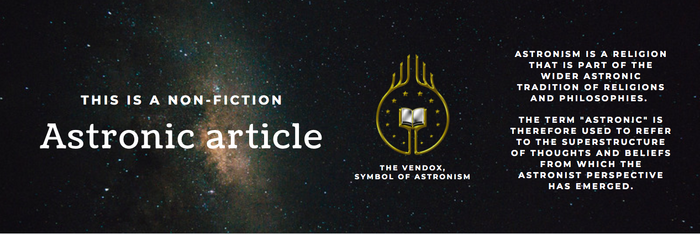(Adding categories) |
No edit summary Tag: Visual edit |
||
| (4 intermediate revisions by the same user not shown) | |||
| Line 1: | Line 1: | ||
| − | {{Millettarian eschatology}}To "'''become One with The Cosmos'''" |
+ | {{Astronism Notice}}{{Millettarian eschatology}}To "'''become One with The Cosmos'''", also referred to as to "'''transform into The Cosmos'''", to "'''become one with the stars'''", or to "'''be sent to the stars'''", are all [[Millettarian eschatology|Astronic eschatological]] and [[Millettarian thanatology|thanatological]] phrases pertaining to the completion of the process known as [[cosmosis|'''cosmosis''']]. They relate to the belief in [[Astronism]] which states that all cosmical entities that reside [[Composity|compositely]] within [[The Cosmos]] shall, upon their destructions or deaths, physically become part of The Cosmos as opposed to being compositely part of The Cosmos. |
| − | It is important to state that becoming or being one with The Cosmos does not pertain to a form of immortality for one ceases to exist upon their cosmosis and therefore, they only continue to exist conceptually, through memories or through objects and idols. The concept and belief of becoming one with The Cosmos is considered from different angles depending on the school of thought to which one belongs. |
+ | It is important to state that becoming or being one with The Cosmos does not pertain to a form of immortality for one ceases to exist upon their cosmosis and therefore, they only continue to exist conceptually, through memories or through objects and idols. The concept and belief of becoming one with The Cosmos is considered from different angles depending on the school of thought to which one belongs. |
| + | == Naturalistic perspective == |
||
| − | The naturalist understanding of cosmosis |
||
| + | From the viewpoint of the [[Naturalism|naturalist school of thought]], cosmosis is considered to be a non-spiritual natural process occurring simultaneously with the biological decomposition of the body after death. For the naturalistic Astronists, cosmosis is considered to be the final process which our existence under goes before our existential cessation. |
||
| − | [[Category:Astronism]] |
||
| + | |||
| + | Naturalism rejects any notion of spiritual or supernatural involvement with the process of cosmosis therefore directly contrasting with the [[Transtellationism|transtellationist school]]. |
||
| + | |||
| + | == Transtellationist perspective == |
||
| + | The point of view of the transtellationist school of thought on the topic of cosmosis is that cosmosis is a spiritual process rather than just a physical one as is believed in naturalism. Transtellationism upholds that upon our corporeal deaths, there will occur a process in which our transformation into The Cosmos is completed by way of transtellation, or another similar supernatural or spiritual experience rather than being conformed to the laws of nature. |
||
| + | |||
| + | The transtellationist understanding prioritises the occurrence of something supernatural and presupposes that the process of cosmosis is one that is of a extramundane nature. |
||
| + | |||
| + | == Transcensionist perspective == |
||
| + | The [[Transcensionism|transcensionist school]] also stands in opposition to the transtellationist school and affirms that cosmosis is instead a process that only involves natural forces. However, the transcensionist school differs from the naturalist school in that it prioritises the process of [[transcension]] and integrates this into the ability for cosmosis to occur. |
||
| + | |||
| + | Critically, transcensionists consider cosmosis not to have yet occurred in any instance principally due to the [[pretranscension]] state that humanity is in. Transcensionists therefore believe that because the transcension of humanity has not yet occurred due to humanity's inability to explore The Cosmos, that cosmosis cannot possibly have yet occurred to any human being. Therefore, transcensionists differ from naturalists in that they consider transcension to be the necessary prerequisite for cosmosis. [[Category:Astronism]] |
||
| + | [[Category:Millettarian eschatology]] |
||
| + | [[Category:Millettarian thanatology]] |
||
Latest revision as of 21:58, 19 April 2020
This article is about a non-fiction entity related to the Astronist belief system or the Astronic tradition.
Any article relating to a fictional entity will be clearly marked as being part of the Spacefaring World.
To "become One with The Cosmos", also referred to as to "transform into The Cosmos", to "become one with the stars", or to "be sent to the stars", are all Astronic eschatological and thanatological phrases pertaining to the completion of the process known as cosmosis. They relate to the belief in Astronism which states that all cosmical entities that reside compositely within The Cosmos shall, upon their destructions or deaths, physically become part of The Cosmos as opposed to being compositely part of The Cosmos.
It is important to state that becoming or being one with The Cosmos does not pertain to a form of immortality for one ceases to exist upon their cosmosis and therefore, they only continue to exist conceptually, through memories or through objects and idols. The concept and belief of becoming one with The Cosmos is considered from different angles depending on the school of thought to which one belongs.
Naturalistic perspective
From the viewpoint of the naturalist school of thought, cosmosis is considered to be a non-spiritual natural process occurring simultaneously with the biological decomposition of the body after death. For the naturalistic Astronists, cosmosis is considered to be the final process which our existence under goes before our existential cessation.
Naturalism rejects any notion of spiritual or supernatural involvement with the process of cosmosis therefore directly contrasting with the transtellationist school.
Transtellationist perspective
The point of view of the transtellationist school of thought on the topic of cosmosis is that cosmosis is a spiritual process rather than just a physical one as is believed in naturalism. Transtellationism upholds that upon our corporeal deaths, there will occur a process in which our transformation into The Cosmos is completed by way of transtellation, or another similar supernatural or spiritual experience rather than being conformed to the laws of nature.
The transtellationist understanding prioritises the occurrence of something supernatural and presupposes that the process of cosmosis is one that is of a extramundane nature.
Transcensionist perspective
The transcensionist school also stands in opposition to the transtellationist school and affirms that cosmosis is instead a process that only involves natural forces. However, the transcensionist school differs from the naturalist school in that it prioritises the process of transcension and integrates this into the ability for cosmosis to occur.
Critically, transcensionists consider cosmosis not to have yet occurred in any instance principally due to the pretranscension state that humanity is in. Transcensionists therefore believe that because the transcension of humanity has not yet occurred due to humanity's inability to explore The Cosmos, that cosmosis cannot possibly have yet occurred to any human being. Therefore, transcensionists differ from naturalists in that they consider transcension to be the necessary prerequisite for cosmosis.


